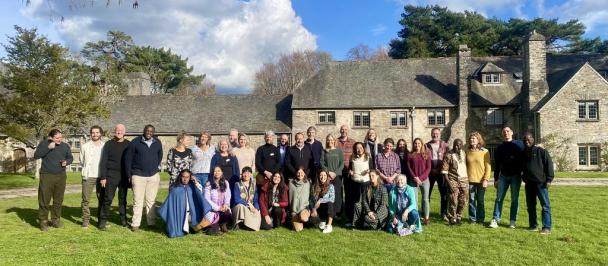
Former Vice President of the United States, Al Gore says that “the more deeply I search for the roots of the global environmental crisis, the more I am convinced that it is an outer manifestation of an inner crisis that is, for lack of a better word, spiritual.”
Last month during New York Climate Week, I was asked if I believed all these events would make any difference in changing food systems. Before answering, I stopped and took a few mindful breaths.
Our United Nations Development Programme (UNDP) convened Conscious Food Systems Alliance (CoFSA) was launched two years ago with unique approach to food systems transformation. We are acknowledging that change starts from within every one of us, in our ways of being, thinking and relating to ourselves, one another and Mother Earth.
Just before Climate Week, we partnered with the Garrison Institute to gather more than 70 food leaders for a three-day retreat in their beautiful centre on the Hudson River. The intention was to create a safe and transformative space to go within together using contemplative practices and discuss from that place of deep connection how we may collaborate. We had time to walk together silently in nature, listening to the Earth for guidance. We practiced mindful eating, looking deeply into our food to see the sun, the rain, the soil, the farmers and the cooks. We shared in intimate groups our feelings of overwhelm and frustration over the climate crisis, but also our sense of purpose and determination, our hopes for the future and our joys. We had very honest and lively discussions on our work. We shared and had fun around the fire the last night and were guided into an indigenous ceremony to close our time together with many prospects for collaboration.

Our members find retreats like this give them the inspiration and confidence to step into this agenda. Many of our 400 members often felt isolated in their own organizations and found in CoFSA the opportunity to connect and collaborate with like-minded professionals, a community they can belong to, as well as the arguments, language, knowledge and tools they need to integrate the role of inner development into their work. Bringing that inner dimension into their professional lives can be a liberating experience.
We found that some 70 percent of our members have already been able to integrate CoFSA practices and agendas into their work, with 85 percent of them considering CoFSA to be instrumental in this process. Some have already been able to go through our Conscious Food Systems Leadership program. Others have received support from our COFSA Incubator to test interventions on the ground or have been involved in collective inquiries on different topics, including farmers wellbeing and psychological resilience, the role of traditional wisdom for conscious food systems or how to cultivate local regenerative cultures.
We also we wanted to use this retreat to step mindfully and heartfully into Climate Week NYC, as we know that this could transform what comes out of it. Spiritual teacher Gary Zukav shared his advice in this 3-minute video.
We convened another event at the end of Climate Week to discuss our experience in trying to go consciously through it. We started with a very slow mindful walk, before sharing from the heart about our experience and listening deeply. Participants highlighted how much this relational space we created contrasted with the very transactional nature of most of the events they attended, where people (too often of white skin), merely talk at each other, and engage in self-promotion.
The very fact that we were sitting in circles with everyone having the space to speak authentically, without hierarchy, made a huge difference to them. Eloisa Trinidad from Chilis on Wheels said, “in some way the design of these events mimics the very problems which have brought the climate crisis,” while Gillian Goddard from the Alliance of Rural Communities and Cross Atlantic Chocolate Collective shared that “maybe we can achieve more by staying in silence together, rather than being caught in all these talks.”
This does not mean that NYC Climate Week is not useful to share our work and nourish collaborations. But how can we expect to respond to the climate crisis effectively if we can’t tap into our collective wisdom, if we can’t bring our whole selves, our truths in the conversation?

To truly transform food systems or address the root causes of the polycrisis we are facing—including outdated mindsets and worldviews, as well as selfishness, greed, fear and apathy—technical solutions will not be enough. Addressing this inner crisis needs to be an integral part of all the solutions we are discussing to transform our broken food systems. Like my response to that question, deeper answers may start with a pause, a few mindful breaths…and end up with an invitation to join us.
This article was originally published in FoodTank.

 Locations
Locations

